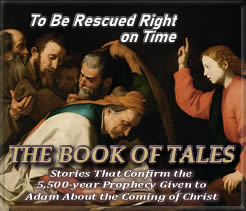A Lack of Perspective (Cont’d)
Because Our Old Nemesis Cynicism Has Had Its Way
According to tradition, we’re told that God’s judgment was the result of humanity becoming so debased and evil that the Lord finally got fed up and pronounced worldwide doom by deluge. As it is written:
Then the Lord saw that the wickedness of man was great in the Earth, and that every intent of the thoughts of his heart was continually evil. And the Lord was sorry that He’d made man on the Earth, and He was grieved in His heart. So the Lord said, “I will destroy man whom I’ve created from the face of the Earth, both man and beast, creeping thing and birds of the air, for I’m sorry that I’ve made them.”
The Book of Genesis
Pretty harsh stuff, if you ask me. And remember: I’m a believer; I’m no cynic. I figure God must have had a pretty good reason for doing what He did. But one thing I can tell you: I’ve always been suspicious that there’s something missing in this account that we’re not being told about. I mean, really, it’s not like God is that shocked at the sight of human sin. This is something we’ve already discussed in an earlier chapter. If human sin was so abhorrent and despicable to God, and so deserving of such cataclysmic judgment, then why didn’t Jesus respond in a similar manner in the presence of prostitutes and tax collectors? So we know there must be another component to this story that could fill in the missing piece of this puzzle. If only we knew where to find it, then maybe the cynical mind would feel less justified in disparaging God for sending the Flood. But what could it be?
Story Continues Below
Says Richard Price—the founder and CEO of Academia.edu—on his podcast In Depth With Academia:
Conquering the Joy of Cynicism and the Death of Beauty: How Your Worldview Shapes the World You Live In is:
To hear Price’s book review of Conquering the Joy of Cynicism and the Death of Beauty, CLICK HERE.
To hear Kent and Zen Garcia continue their discussion concerning the implications of the 5,500-year chronology from Adam to Christ as it pertains to the faithfulness of God, CLICK BELOW.
Story Continues From Above
Well, as it turns out, the component we’re looking for can be found in some biblical clues that have been staring us in the face all along. Too bad, though, that our old nemesis cynicism has had its way in obscuring a view of those clues so that traditional biblical history no longer makes clear what that component is. To see what I mean by that just look at the verses that lead up to those we’re most familiar with—believers and unbelievers alike.
Now it came to pass, when men began to multiply on the face of the Earth, and daughters were born to them, that the sons of God saw the daughters of men, that they were beautiful; and they took wives for themselves of all whom they chose.
And the Lord said, “My Spirit won’t strive with humans forever, because they’re only flesh; yet their days shall be one hundred and twenty years.” There were giants on the Earth in those days, and afterward, when the sons of God came in to the daughters of men, they bore children to them. Those were the mighty men who were of old, men of renown.
The Book of Genesis
So there we have it, the hidden clue we need to put this story into its proper context, one which is typically glossed over due to the subtlety of the Genesis account.
“But wait,” you might interject, “didn’t you say that the real culprit, as usual, was cynicism? How does that come into play with the traditional reading of these verses?”
To which I’d reply: “It does so by way of Moses deciding to leave something out in his rendition of Noah’s Flood.”
“Moses’ rendition? What’s that supposed to mean? Is there another rendition of this story that we don’t know about?”
As a matter of fact, yes, there is. And it just so happens that the reason most believers in The Bible are unaware of this rendition is due to the cynicism of several Church Fathers who banned it because they disapproved of its telling of the Flood, which just happened to provide the real reason why God destroyed the world’s population the way He did.







